Table of Contents
Are you exploring options beyond Rocket.net for your website hosting needs? While Rocket.net provides a robust platform for WordPress, complete with integrated CDN and security measures, the hosting landscape offers a diverse array of solutions. You may be seeking more budget-friendly plans, distinct performance characteristics, or specialized functionalities tailored to your WordPress site. The year 2025 presents numerous compelling alternatives worth considering.
This extensive guide will delve into Rocket.net’s top 10 competitors. These platforms deliver exceptional performance, robust security, and outstanding value. We will meticulously examine their core features, pricing models, and optimal use cases. This detailed analysis will empower you to pinpoint the perfect hosting solution to elevate your online presence.
1. Elementor Hosting: WordPress Hosting Optimized for Elementor Users
Elementor Hosting has quickly become a leading WordPress hosting solution in 2025. It provides an optimized environment specifically designed for WordPress websites, particularly those built with the popular Elementor website builder. This all-in-one solution makes website creation, hosting, and scaling simple, offering exceptional performance and ease of use.
Key Features
Elementor Hosting delivers a tightly integrated experience for WordPress users on a fast, powerful cloud infrastructure:
- Lightning-Fast Speed: Managed hosting built on Google Cloud’s C2 infrastructure delivers unmatched speed and reliability. You’ll benefit from advanced caching, customization options, and Zero Handshake TLS for faster encrypted data transfer.
- Enterprise-Level CDN: All plans include Cloudflare CDN, which has over 200 edge locations worldwide. This ensures that your content loads quickly for visitors no matter where they are.
- NVMe Storage: Every plan uses cutting-edge NVMe storage, providing much faster read/write speeds for near-instant page loads and smooth editing.
- Daily Automatic Backups: Your data stays safe with automated daily backups and easy restoration options. Higher-tier plans offer backup retention for up to 30 days.
- Comprehensive Security: Multiple security layers include free Premium SSL certificates, enterprise-grade WAF protection, DDoS mitigation, bot protection, multi-factor authentication, and automatic security updates.
- Staging Environment: Test changes safely before publishing them to your live site. Higher-tier plans also include site cloning for easy duplication.
- Free Domain: Every Elementor Hosting plan includes a free domain for the first year.
- Auto-Scaling Technology: Handle traffic surges seamlessly during peak times or special promotions with built-in auto-scaling.
- Elementor Optimization: The platform is specifically engineered for peak performance with the Elementor website builder.
Pricing Plans
Elementor Hosting offers several plans to suit different website needs, with annual billing and a 30-day money-back guarantee:
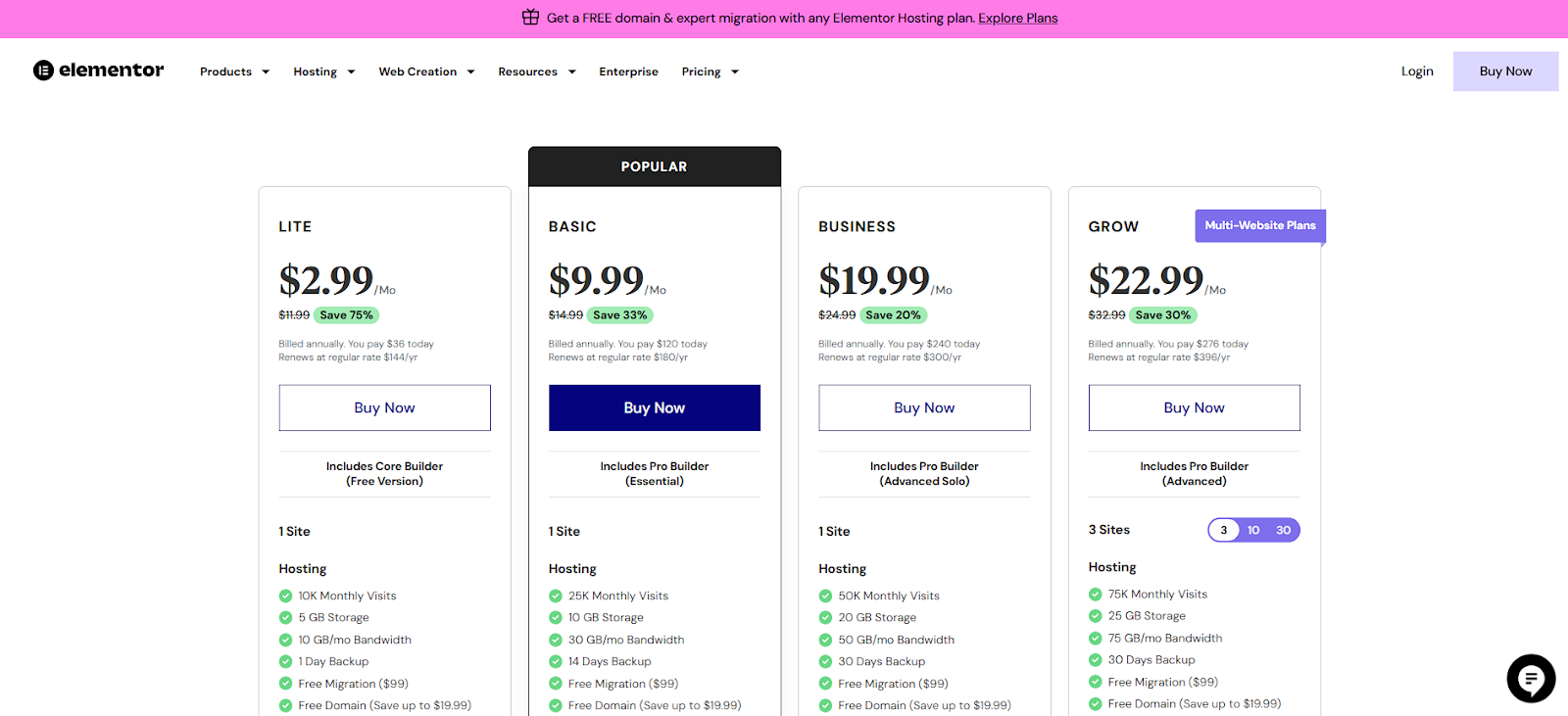
- Lite: $2.99/month (billed annually at $36) – Includes Elementor Core, one site, 10K monthly visits, 5 GB storage, 10 GB bandwidth, and 1-day backups.
- Basic: $9.99/month (billed annually at $120). It includes Elementor Core, one site, 25K monthly visits, 10 GB storage, 30 GB bandwidth, and 14-day backups.
- Business: $19.99/month (billed annually at $240) – Includes Elementor Core, one site, 50K monthly visits, 20 GB storage, 50 GB bandwidth, 30-day backups, and staging environment.
- Grow: $22.99/month (billed annually at $276) – Includes Elementor Core, three sites, 75K monthly visits, 25 GB storage, 75 GB bandwidth, 30-day backups, staging environment, and site cloning.
- Scale: $49.99/month (billed annually at $599.88) – Includes Elementor Core, 10 sites, 100K monthly visits, 40 GB storage, 100 GB bandwidth, 30-day backups, staging environment, and site cloning.
- Ultimate: $99.99/month (billed annually at $1199.88) – Includes Elementor Core, 30 sites, 250K monthly visits, 80 GB storage, 250 GB bandwidth, 30-day backups, staging environment, and site cloning.
While Elementor Hosting includes the core Elementor plugin, Elementor Pro is a separate purchase. This allows users to choose the Pro features only if and when they need them. Specific pricing details are available on the Elementor website and may vary based on promotional offers.
All plans include a free domain for the first year, free migration (valued at $99), Premium SSL, Enterprise Cloudflare CDN, auto-scaling, and 24/7 expert support.
Ideal For
Elementor Hosting works best for:
- Users who build websites with Elementor
- Individuals and small businesses wanting a managed WordPress solution
- Those who prioritize website speed and seamless Elementor integration
- Users who value ease of use and a streamlined workflow
Grow Your Sales
- Incredibly Fast Store
- Sales Optimization
- Enterprise-Grade Security
- 24/7 Expert Service

- Incredibly Fast Store
- Sales Optimization
- Enterprise-Grade Security
- 24/7 Expert Service
- Prompt your Code & Add Custom Code, HTML, or CSS with ease
- Generate or edit with AI for Tailored Images
- Use Copilot for predictive stylized container layouts

- Prompt your Code & Add Custom Code, HTML, or CSS with ease
- Generate or edit with AI for Tailored Images
- Use Copilot for predictive stylized container layouts
- Craft or Translate Content at Lightning Speed
Top-Performing Website
- Super-Fast Websites
- Enterprise-Grade Security
- Any Site, Every Business
- 24/7 Expert Service

Top-Performing Website
- Super-Fast Websites
- Enterprise-Grade Security
- Any Site, Every Business
- 24/7 Expert Service
- Drag & Drop Website Builder, No Code Required
- Over 100 Widgets, for Every Purpose
- Professional Design Features for Pixel Perfect Design

- Drag & Drop Website Builder, No Code Required
- Over 100 Widgets, for Every Purpose
- Professional Design Features for Pixel Perfect Design
- Marketing & eCommerce Features to Increase Conversion
- Ensure Reliable Email Delivery for Your Website
- Simple Setup, No SMTP Configuration Needed
- Centralized Email Insights for Better Tracking

- Ensure Reliable Email Delivery for Your Website
- Simple Setup, No SMTP Configuration Needed
- Centralized Email Insights for Better Tracking

- Ensure Reliable Email Delivery for Your Website
- Simple Setup, No SMTP Configuration Needed
- Centralized Email Insights for Better Tracking
2. HostGator: Reliable WordPress Hosting with Generous Resources
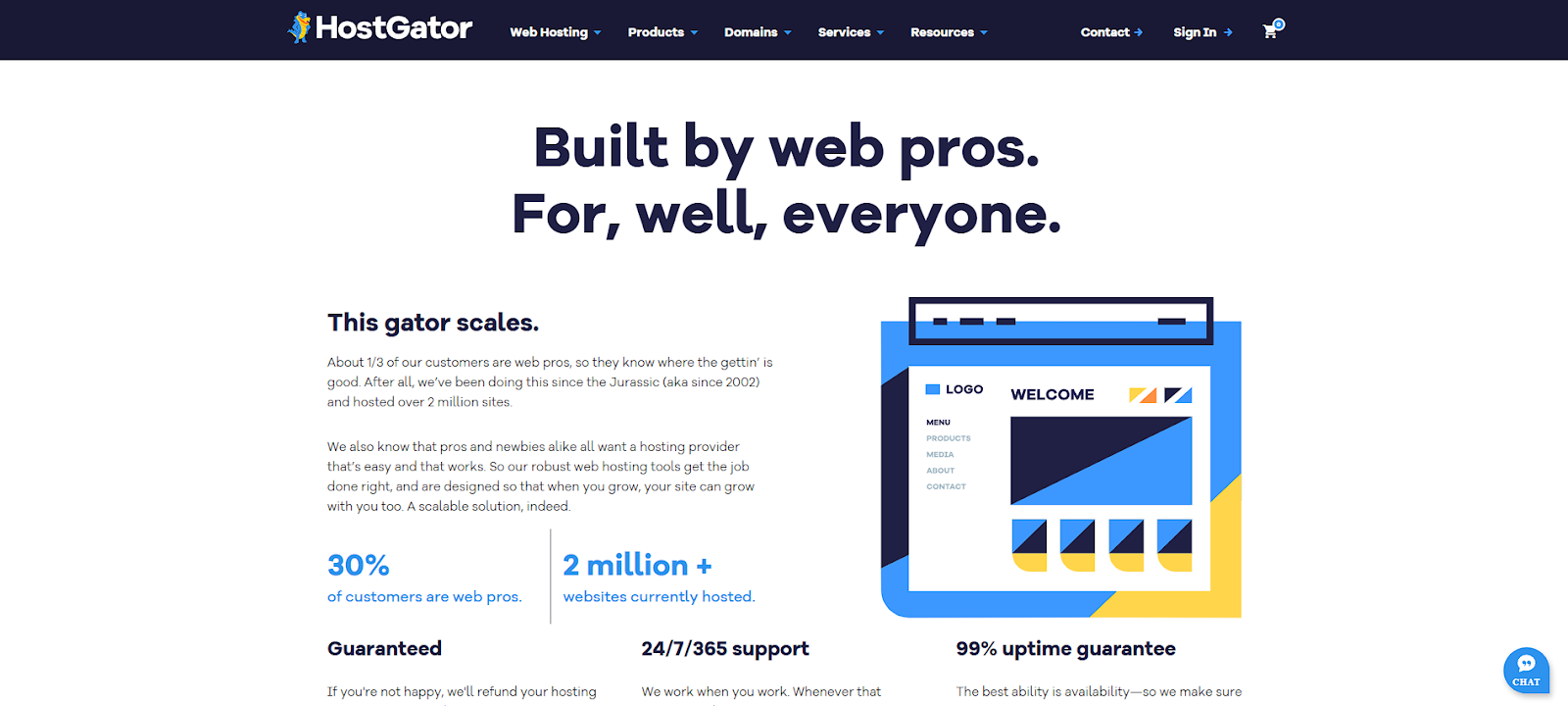
HostGator is a well-known provider offering a broad range of hosting services, including plans optimized for WordPress. With a focus on affordability and ease of use, HostGator aims to provide reliable hosting for a wide audience.
Key Features
HostGator offers various features for WordPress users:
- Easy WordPress Setup: Simple tools for quick website launch
- User-Friendly Control Panel: cPanel interface for easy management
- Free SSL Certificate: HTTPS security included
- Unmetered Bandwidth: No traffic limitations on most plans
- Free Domain: Often included with annual plans
- 24/7 Technical Support: Available via phone, chat, and email
- 99.9% Uptime Guarantee: Ensures website reliability
Pricing
HostGator offers web hosting with generous resources:
- Hatchling Plan: $3.75/month (renews at $10.99/month) – 10 websites, 10GB storage, free domain
- Baby Plan: $4.50/month (renews at $16.49/month) – 20 websites, 20GB storage, Cloudflare CDN
- Business Plan: $6.25/month (renews at $21.99/month) – 50 websites, 50GB storage, daily backups
Ideal For
HostGator works best for:
- Beginners seeking affordable, easy-to-use WordPress hosting
- Small businesses appreciating unmetered bandwidth
- Users who prefer the cPanel control panel
- Those who value 24/7 support availability
3. WP Engine: Premium Managed WordPress Hosting for Businesses
WP Engine is a well-established leader in managed WordPress hosting, known for its robust platform, advanced features, and strong focus on security and performance. They offer comprehensive tools and services for WordPress websites of all sizes.
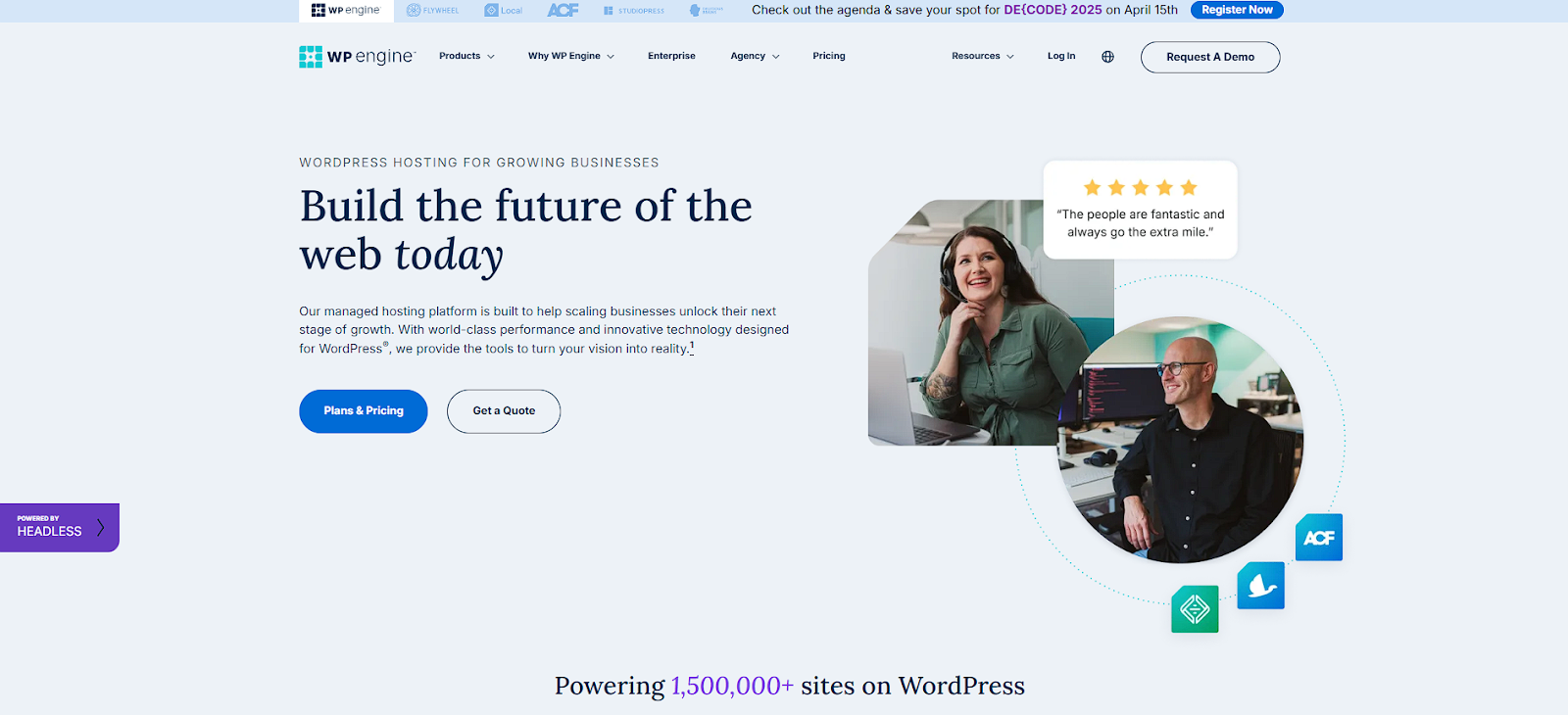
Key Features
WP Engine provides a secure, fast, and scalable WordPress hosting environment with:
- Global CDN: Integrated with Cloudflare for faster content delivery worldwide
- EverCache: Their custom caching solution optimizes WordPress performance
- Daily Automatic Backups: Reliable daily backups with easy restore options
- Free SSL: Included for enhanced security on all plans
- One-Click Staging: Test changes safely before deploying to your live site
- Threat Detection: Proactive security measures to protect your website
- 24/7 Expert Support: Highly knowledgeable WordPress support team
Pricing
WP Engine offers premium pricing with several tiers:
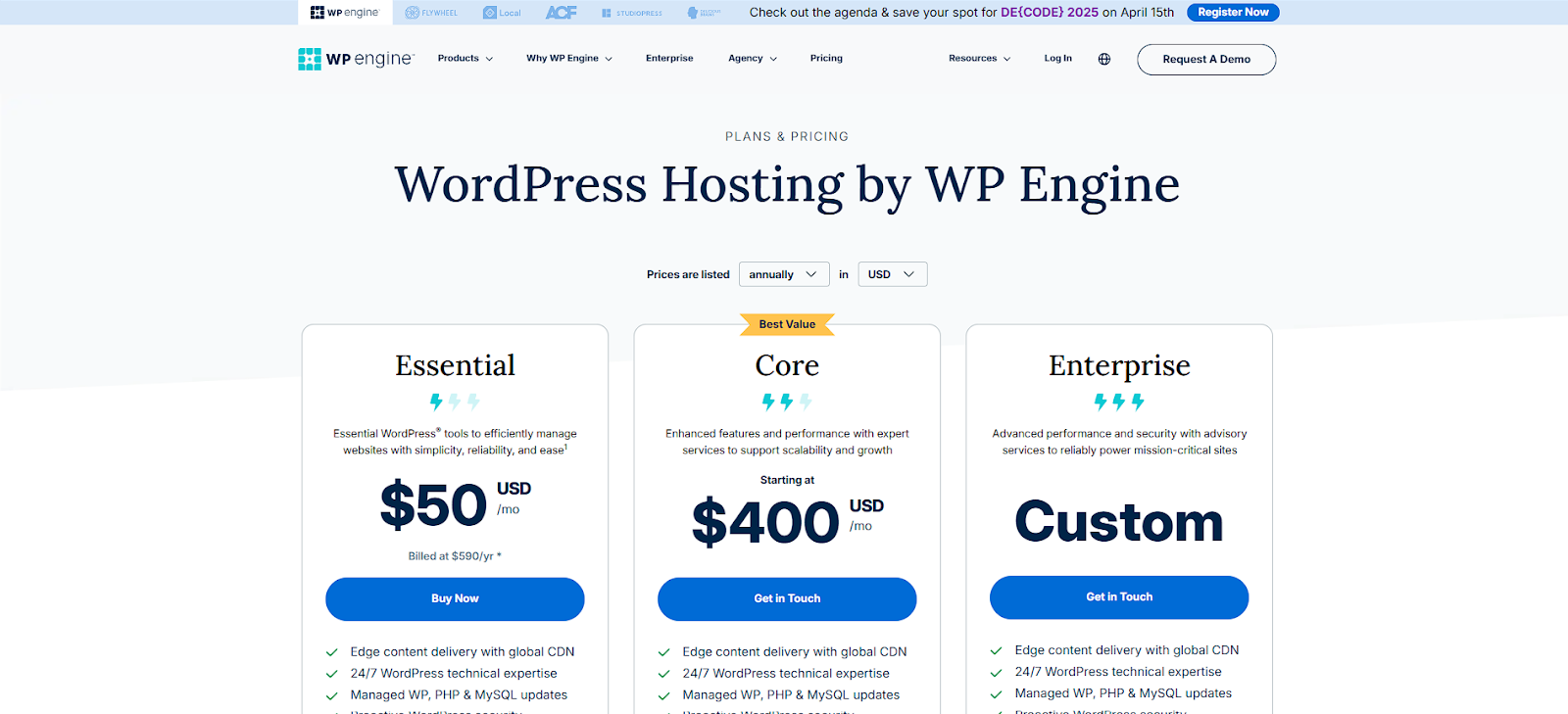
- Startup: From $25/month
- Essential: From $50/month (annual billing)
- Professional: From $50/month
- Growth: From $96/month
- Scale: From $242/month
- Core: From $400/month
- Enterprise: Custom pricing (contact required)
Prices increase based on the number of sites, monthly visits, storage space, and bandwidth.
Ideal For
WP Engine works best for:
- Businesses with mission-critical websites requiring high security
- Developers and agencies seeking advanced tools and a robust platform
- Users who need top-tier performance, security, and expert support
4. SiteGround: Balanced WordPress Hosting with Strong Support
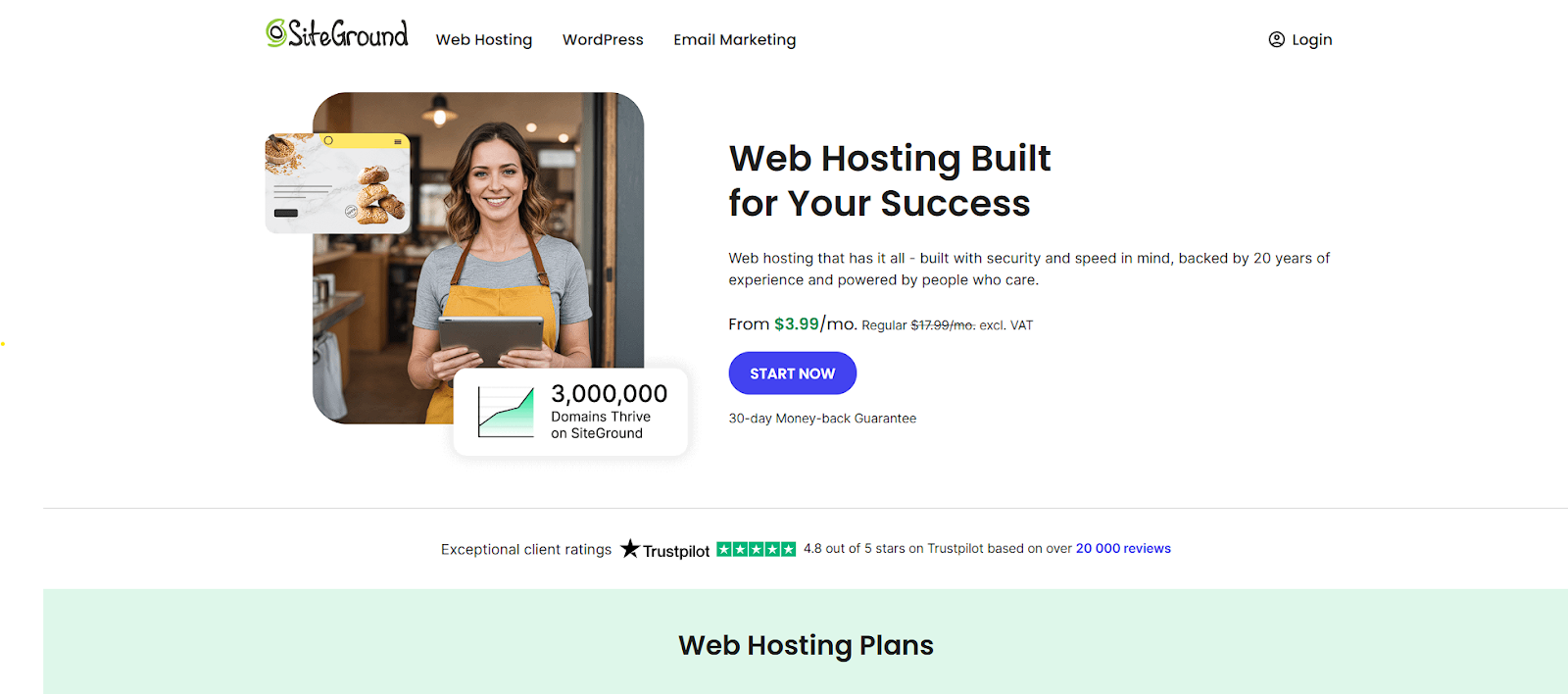
SiteGround has earned a strong reputation in the WordPress community for its commitment to performance, security, and exceptional customer support. They offer a range of solutions optimized for WordPress users.
Key Features
SiteGround invests in technology to deliver fast and reliable WordPress hosting:
- Optimized PHP: Using the latest PHP versions for better performance
- SuperCacher: Custom caching system with multiple layers
- SG Optimizer Plugin: WordPress plugin for additional optimization
- Automatic WordPress Updates: Keeping core and plugins updated
- Free SSL and CDN: Enhanced security and performance included
- Staging Environment: Available on higher-tier plans
- Highly-Rated Support: 24/7 team praised for responsiveness and knowledge
Pricing
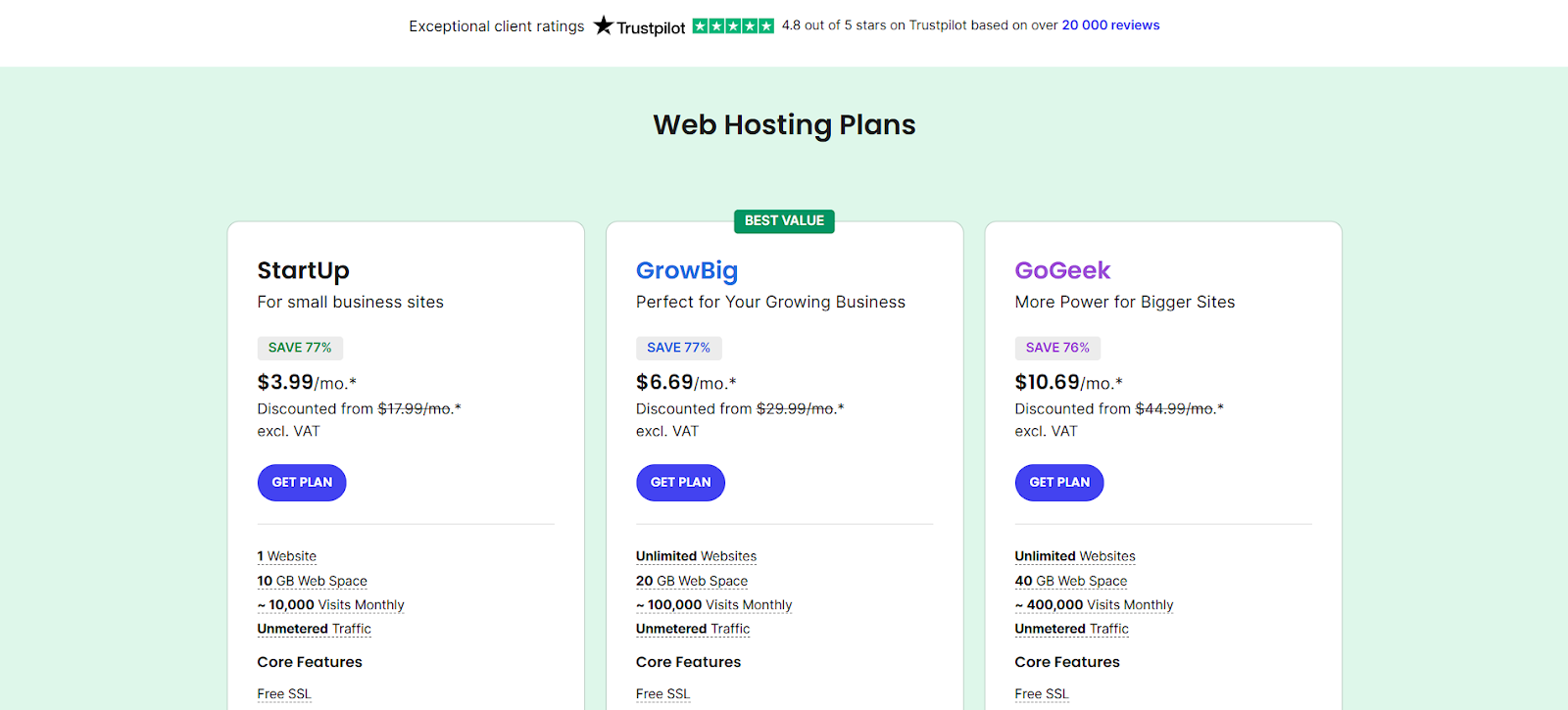
SiteGround offers three main WordPress hosting plans:
- StartUp: $3.99/month intro ($14.99 regular) – 1 website, 10GB storage, ~10,000 monthly visits
- GrowBig: $6.69/month intro ($24.99 regular) – Unlimited websites, 20GB storage, ~25,000 monthly visits
- GoGeek: $10.69/month intro ($39.99 regular) – Unlimited websites, 40GB storage, ~100,000 monthly visits
All plans include free SSL, CDN, daily backups, and email hosting.
Ideal For
SiteGround works best for:
- WordPress users at any level, from beginners to developers
- Those who value website speed and helpful support
- Individuals and businesses wanting user-friendly features
5. Cloudways: Flexible Cloud Hosting Platform with Provider Choice
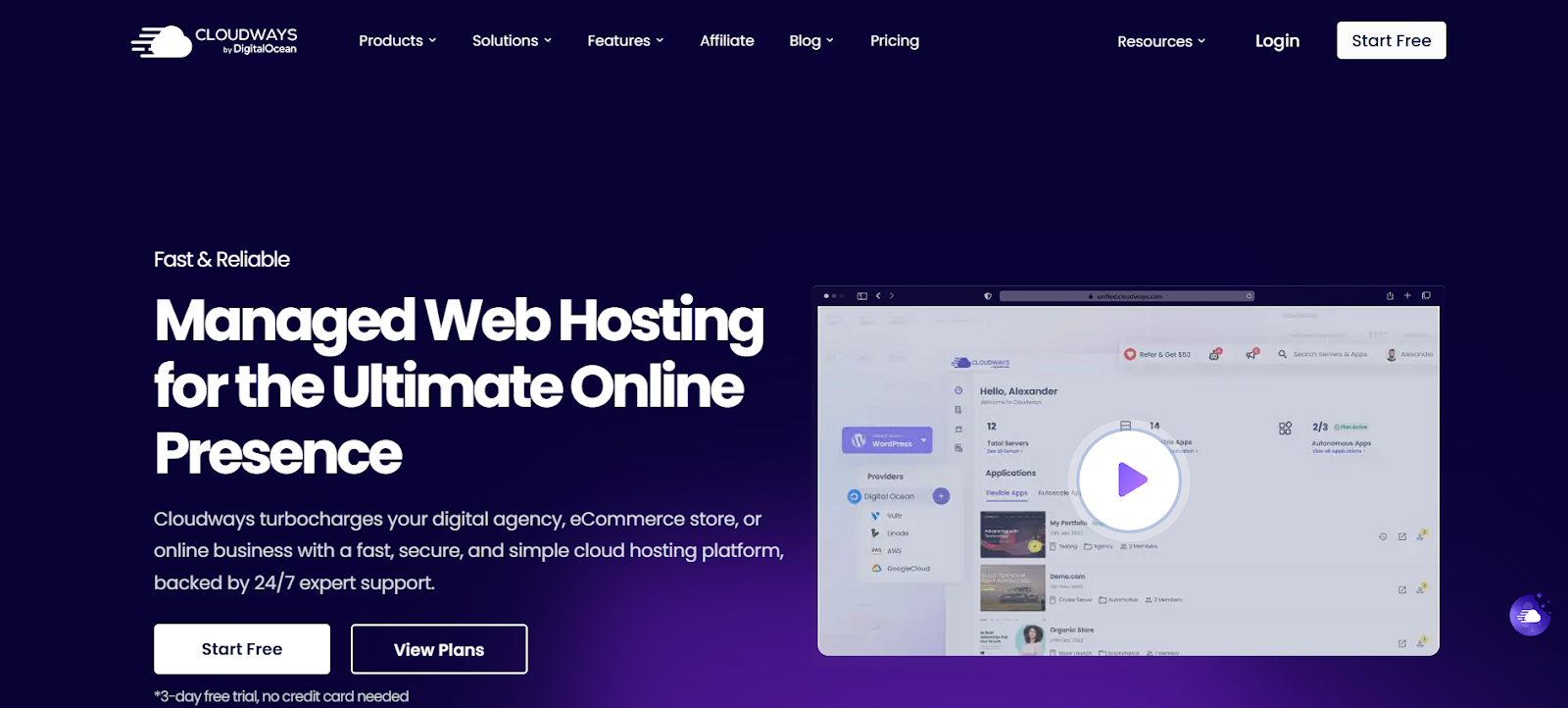
Cloudways offers a unique approach by letting you choose from various cloud providers (DigitalOcean, Linode, Vultr, AWS, Google Cloud) while they manage the server for you, creating an optimized environment for WordPress.
Key Features
Cloudways provides flexibility and control over your hosting infrastructure:
- Multiple Cloud Providers: Choose from leading cloud infrastructure providers
- Managed Server Administration: Cloudways handles technical server management
- WordPress-Optimized Stack: Servers configured for maximum WordPress performance
- Free SSL and CDN Integration: Enhanced security and speed
- Staging Environment: Create staging sites for testing changes
- Easy Scaling: Adjust server resources as your needs grow
- 24/7 Support: Available via chat and tickets
Pricing
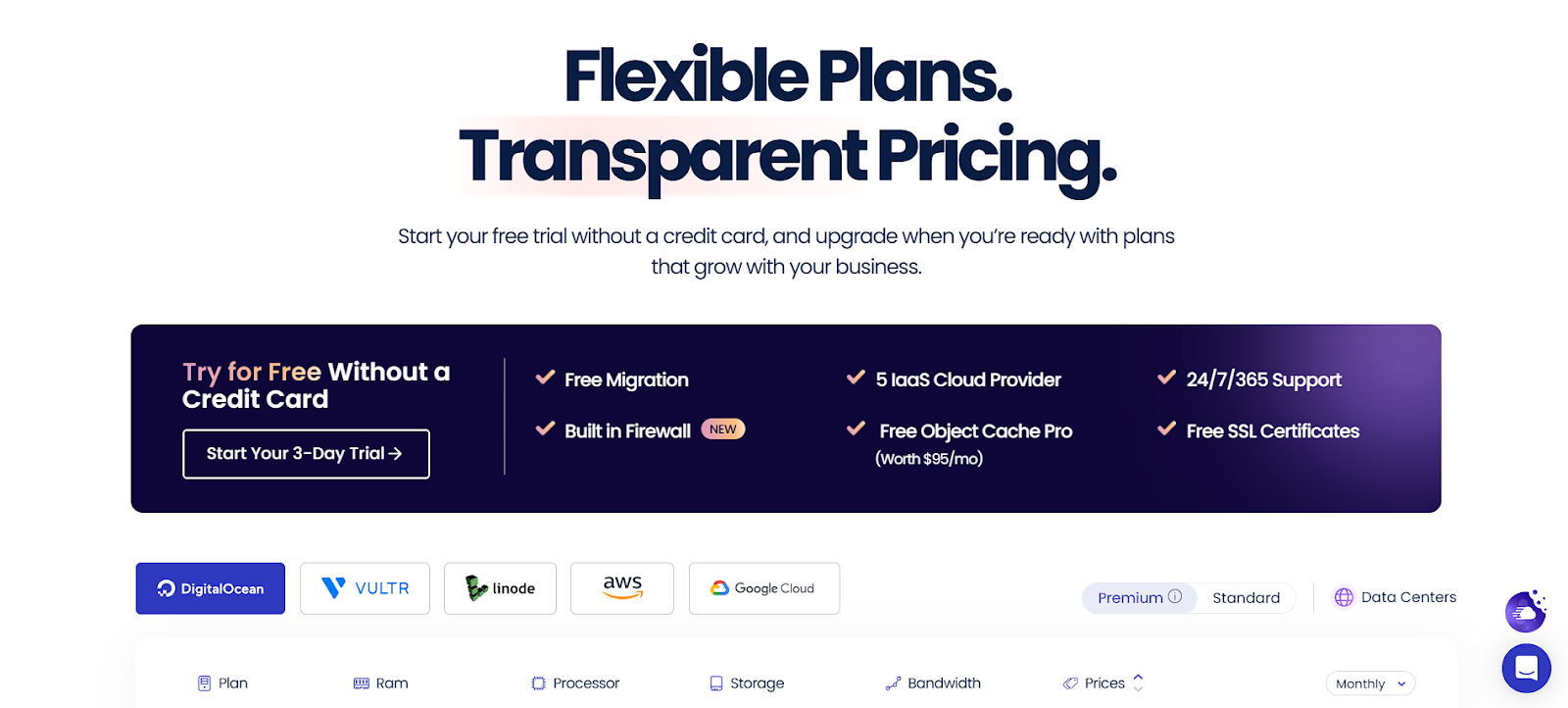
Cloudways offers flexible pricing with a 3-day free trial (no credit card required). Their DigitalOcean plans start at:
- $14/month: 1GB RAM, 1 Core, 25 GB Storage, 1 TB Bandwidth
All plans include 24/7 support, free migration, free SSL, built-in firewall, unlimited application installs, staging environment, and automated backups.
Optional add-ons include Enterprise Cloudflare CDN, SafeUpdates, malware protection, email services, and advanced support.
Ideal For
Cloudways works best for:
- Users wanting more control over their hosting infrastructure
- Developers and technically-minded users
- Websites with fluctuating traffic needing scalability
- Those seeking cost-effective cloud hosting solutions
6. DreamHost: WordPress Hosting with Open Source Commitment
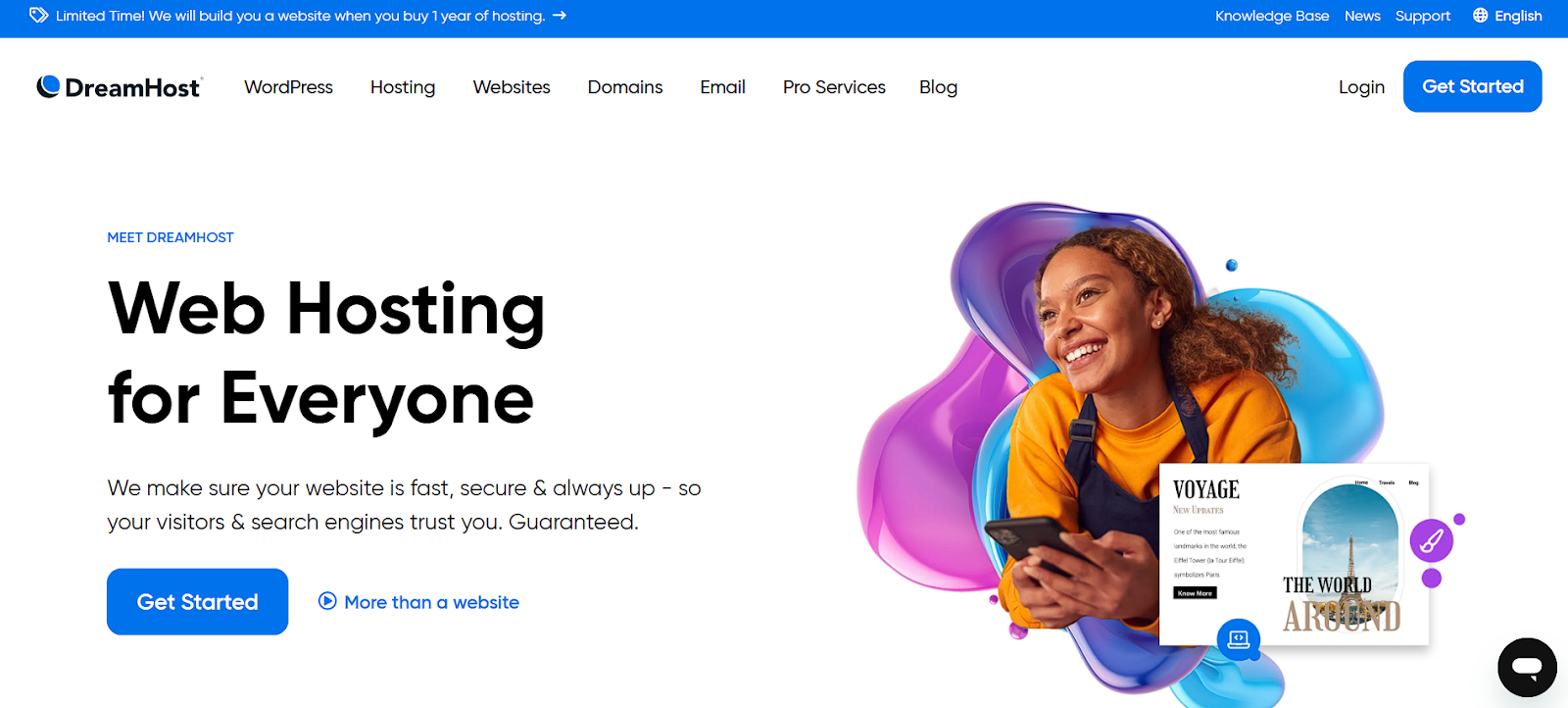
DreamHost is a well-established hosting provider with a long history in the industry. They offer various hosting solutions with a strong emphasis on WordPress and open-source technologies.
Key Features
DreamHost provides solid WordPress hosting features:
- Simple WordPress Setup: Easy installation process
- Free Website Migration: Tools to move existing WordPress sites
- Automatic WordPress Updates: Keep your installation current
- Free SSL Certificate: HTTPS security included
- Unlimited Bandwidth: Most plans allow unlimited data transfer
- Daily Automatic Backups: Regular backups for data protection
- Staging Environment: Available on some plans
- Developer Tools: WP-CLI and SSH access for advanced users
- 24/7 Support: Available via chat and email
Pricing
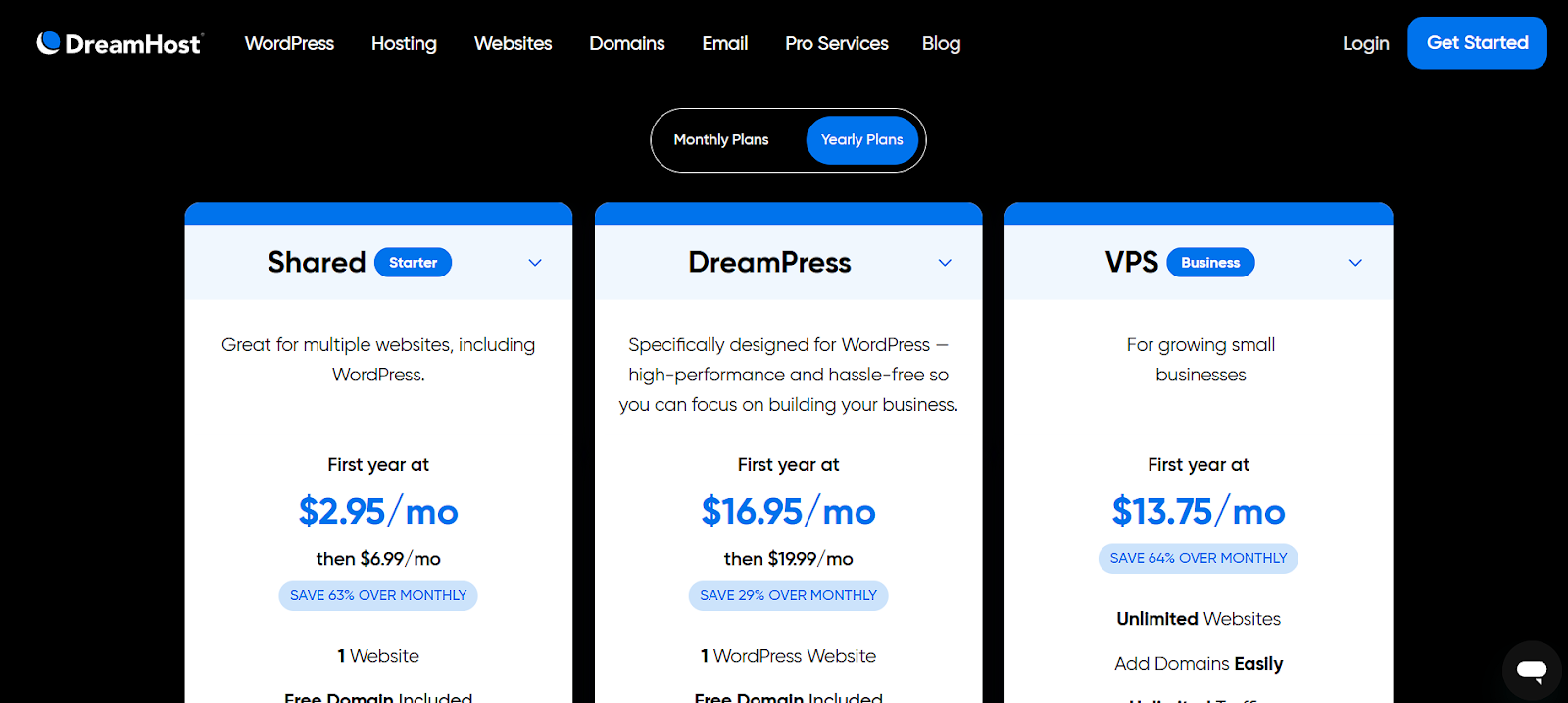
DreamHost offers various plans with promotional first-year pricing:
- Shared Starter: $2.95/month first year, then $6.99/month – 1 website, unlimited traffic
- DreamPress: $16.95/month first year, then $19.99/month – 1 WordPress site, ~100k monthly visitors
- VPS Business: $13.75/month first year – Unlimited websites, 2 GB RAM, 60 GB NVMe storage
Ideal For
DreamHost works best for:
- Bloggers and small businesses wanting reliable, affordable hosting
- Users who need unlimited bandwidth
- Developers who want WP-CLI and SSH access
- Those who value WordPress and open-source commitment
7. Kinsta: High-Performance WordPress Hosting on Google Cloud
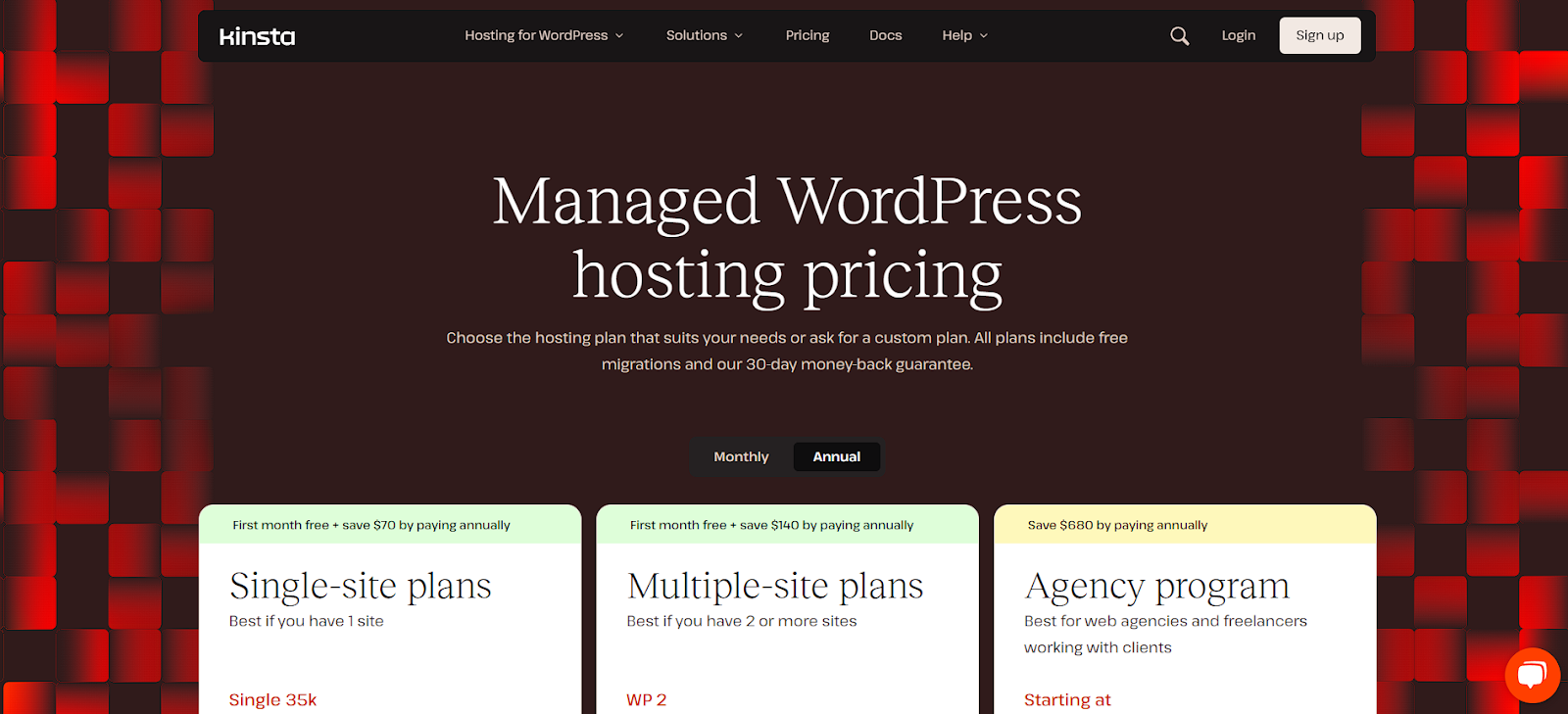
Kinsta delivers premium managed WordPress hosting known for exceptional performance and reliability. Powered entirely by Google Cloud Platform, it serves businesses and individuals who need top-tier speed and scalability.
Key Features
Kinsta focuses on delivering high-performance, secure WordPress hosting:
- Google Cloud Infrastructure: Leverages Google’s global network for speed
- Latest PHP Support: Ensures optimal performance with newer PHP versions
- Daily Automatic Backups: Regular backups with easy restoration
- Free SSL and CDN: Included for better security and performance
- One-Click Staging: Test changes safely before going live
- Developer Tools: SSH access, WP-CLI, and Git integration
- WordPress-Focused Support: Specialized WordPress support team
Pricing

Kinsta offers premium pricing built on Google Cloud:
- Single-site plans: Start at $30/month (1 WordPress install, 35k visits, 10GB storage)
- Multiple-site plans: From $59/month (2 WordPress installs, 70k visits, 20GB storage)
- Agency plans: From $284/month
- Enterprise solutions: Custom pricing starting at $500/month
Many plans include the first month free.
Ideal For
Kinsta works best for:
- Businesses and high-traffic websites need exceptional performance
- Developers and agencies requiring advanced features
- Users prioritizing speed, security, and expert WordPress support
8. Flywheel: WordPress Hosting with Designer-Friendly Tools
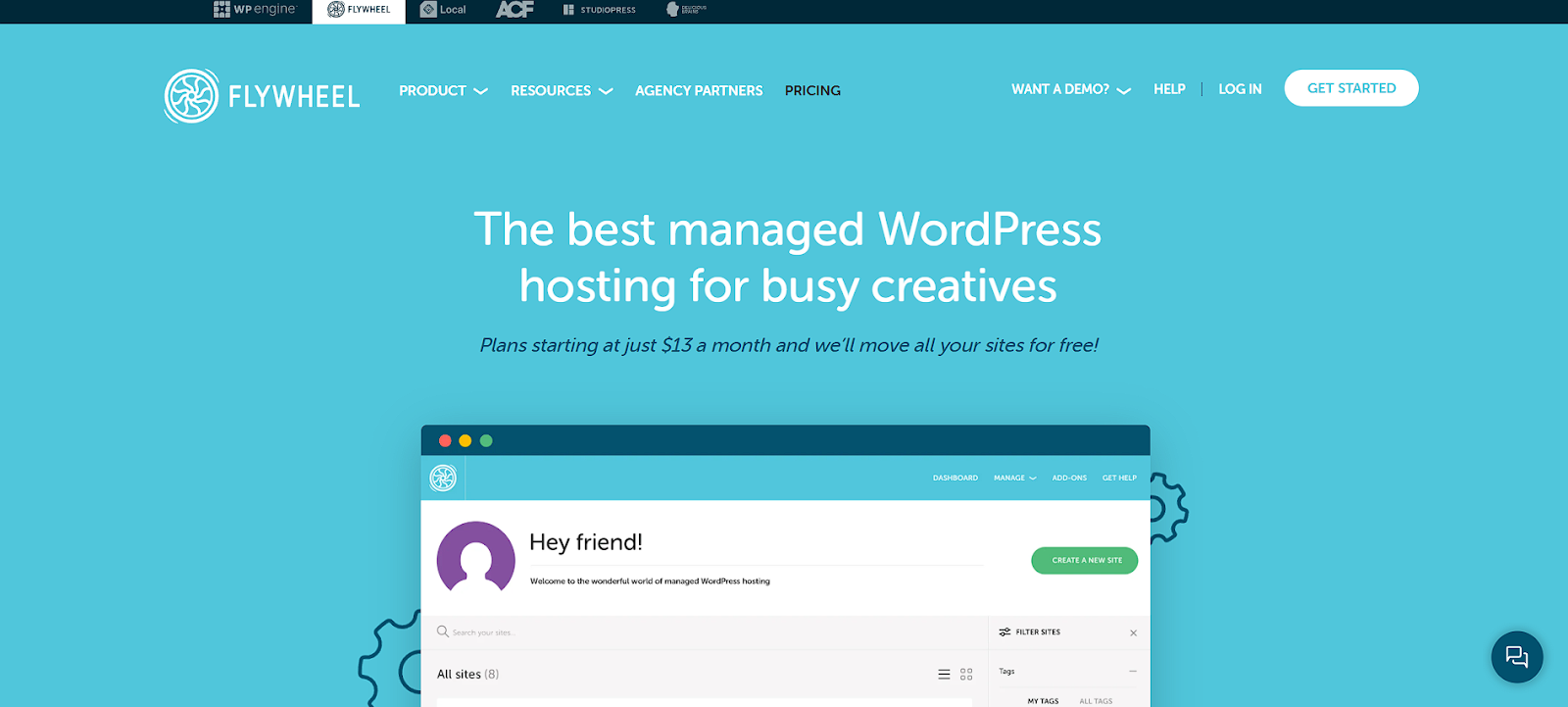
Flywheel (now part of WP Engine) provides managed WordPress hosting, emphasizing streamlining workflows for individuals, freelancers, and agencies. The platform stands out for its user-friendly interface and collaboration tools.
Key Features
Flywheel offers features designed to make WordPress management easier:
- Clean User Interface: Intuitive and easy-to-navigate dashboard
- Security and Speed: Free SSL and CDN included
- Nightly Automatic Backups: Regular backups of your website data
- Staging Environment: Create test sites before pushing changes live
- Collaboration Tools: Features for client billing and team access
- Local Development: Free tool (Local) for WordPress development
- Responsive Support: 24/7 expert WordPress help
Pricing
Flywheel offers tiered plans with annual billing that include two months free:
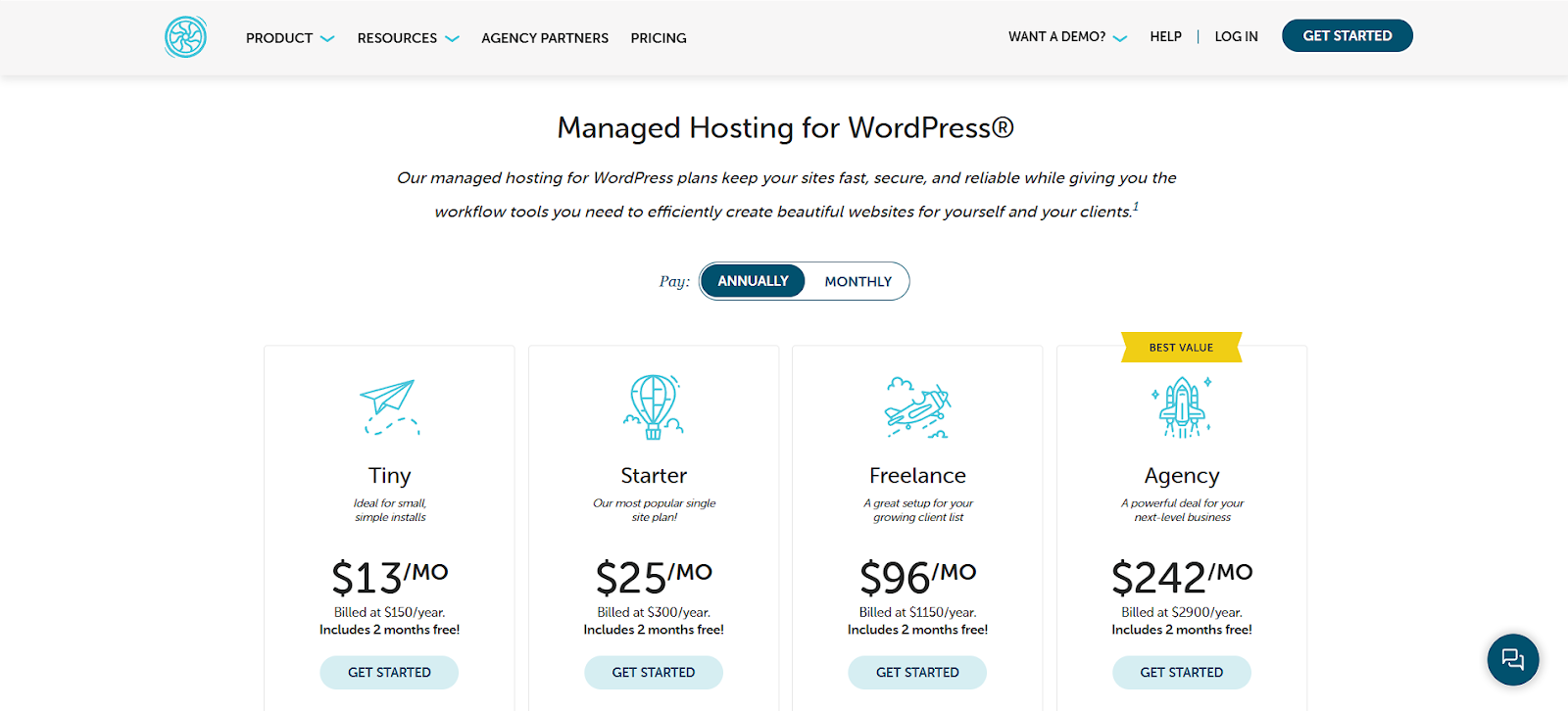
- Tiny: $13/month ($150/year) – 1 site, 5,000 monthly visits, 5GB storage
- Starter: $25/month ($300/year) – 1 site, 25,000 monthly visits, 10GB storage
- Freelance: $96/month ($1150/year) – Up to 10 sites, 100,000 monthly visits, 20GB storage
- Agency: $242/month ($2900/year) – Up to 30 sites, 400,000 monthly visits, 50GB storage
- Custom Plans: Available for larger needs
Ideal For
Flywheel works best for:
- WordPress agencies and freelancers needing collaboration tools
- Designers and developers who want a user-friendly interface
- Those seeking simplified managed WordPress hosting
9. Bluehost: Budget-Friendly WordPress Hosting for Beginners
Bluehost has long been recognized in the web hosting industry, particularly within the WordPress community. Known for its beginner-friendly interface and wide range of services, Bluehost offers a solid entry point for individuals and small businesses.
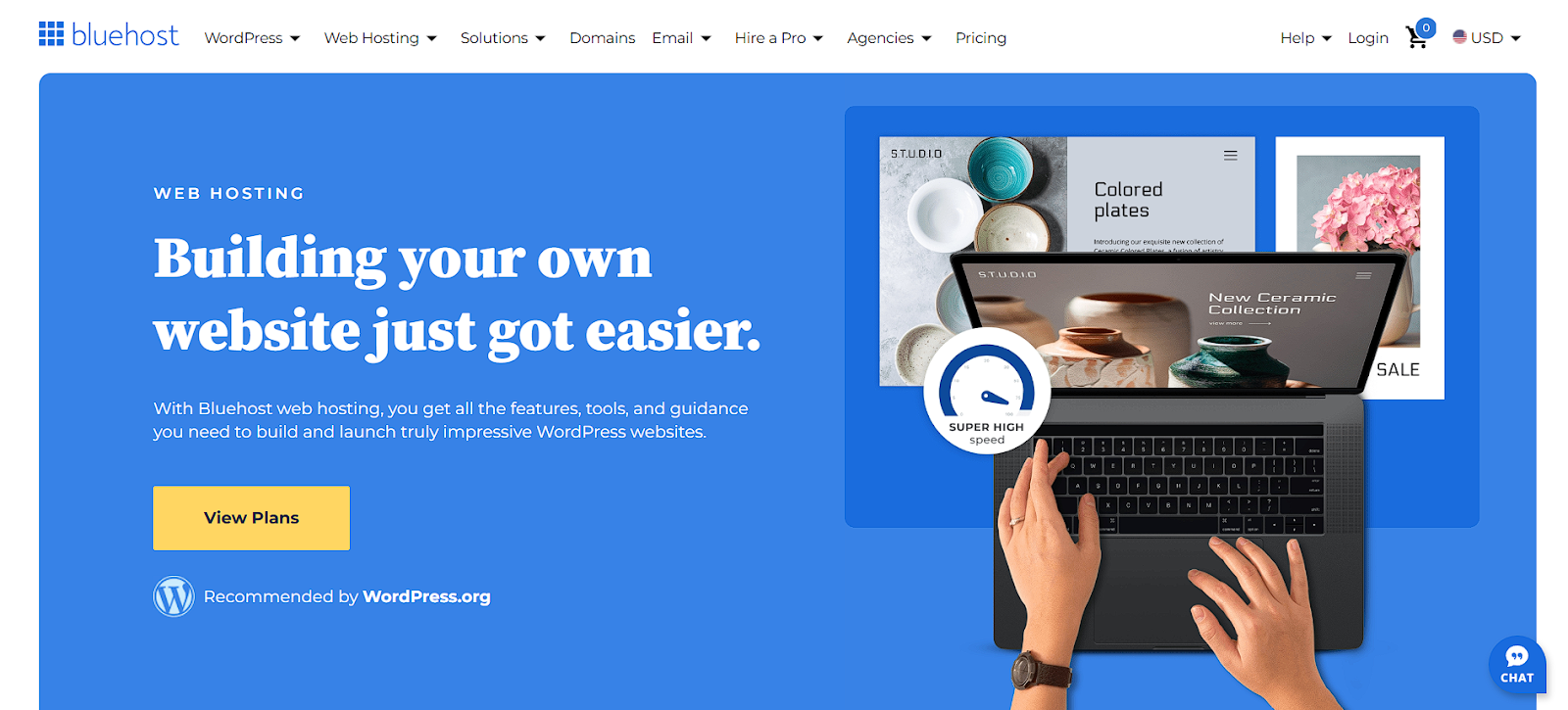
Key Features
Bluehost makes WordPress website management simple:
- One-Click WordPress Installation: Get started quickly with automated setup
- User-Friendly Control Panel: Easy access to website management tools
- Free SSL Certificate: Secure your site with HTTPS included
- Automatic WordPress Updates: Keep your core installation secure
- Built-In Caching: Improve website loading speed automatically
- CDN Integration: Easy setup with content delivery networks
- 24/7 Support: Available through chat, phone, and email
Pricing
Bluehost offers affordable plans with promotional starting prices:
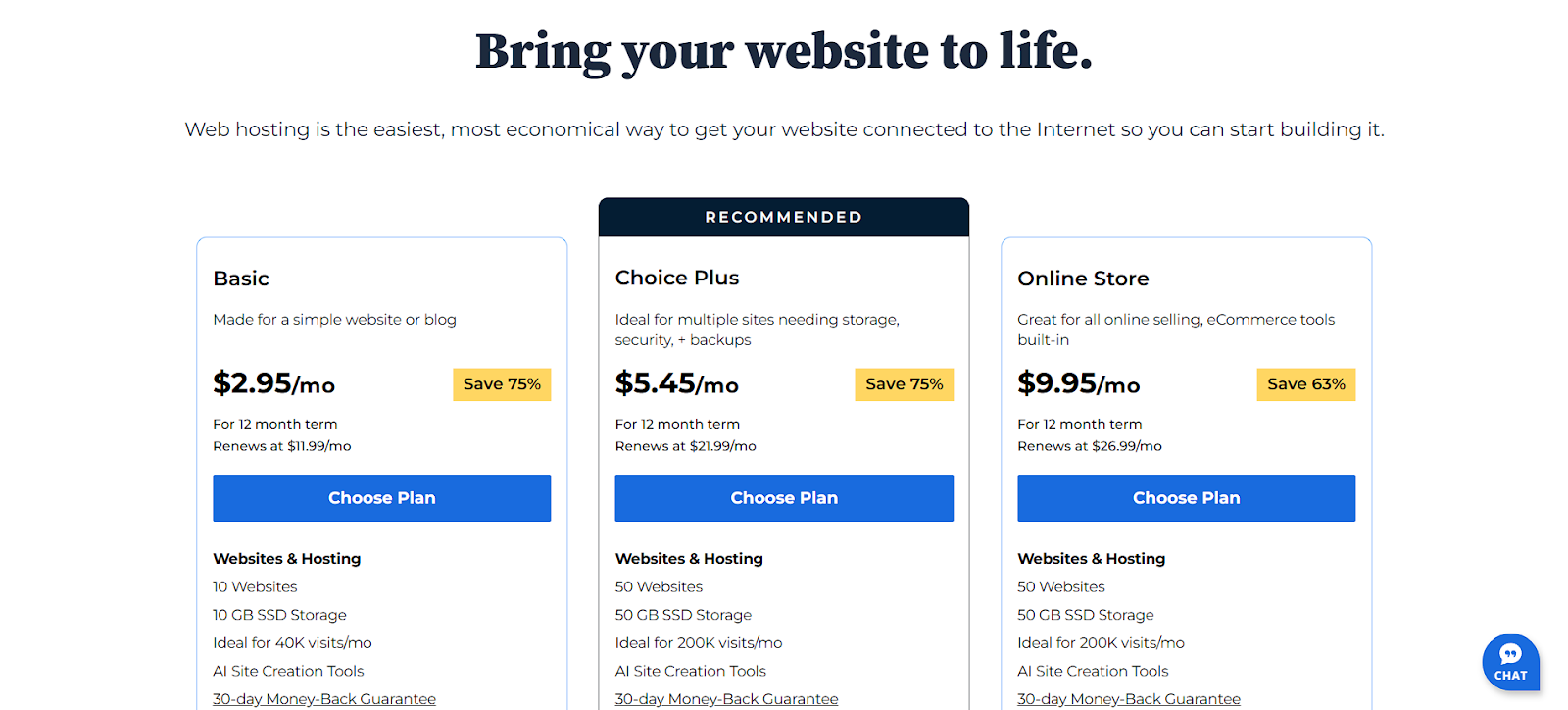
- Basic: $2.95/month (renews at $11.99/month) – One website, 10 GB storage, free domain for first year
- Choice Plus: $5.45/month (renews at $21.99/month) – 50 websites, 50 GB storage, free domain privacy
- Online Store: $9.95/month (renews at $26.99/month) – 50 websites, 50 GB storage, eCommerce tools
Ideal For
Bluehost works best for:
- Beginners new to WordPress and web hosting
- Individuals and small businesses seeking affordable hosting
- Users wanting a simple control panel and available support
- Those who need an automatic WordPress setup
10. A2 Hosting: Speed-Focused WordPress Hosting
A2 Hosting has built its reputation on speed, providing features that appeal to both beginners and experienced developers. They offer various hosting solutions with a focus on performance optimization for WordPress.
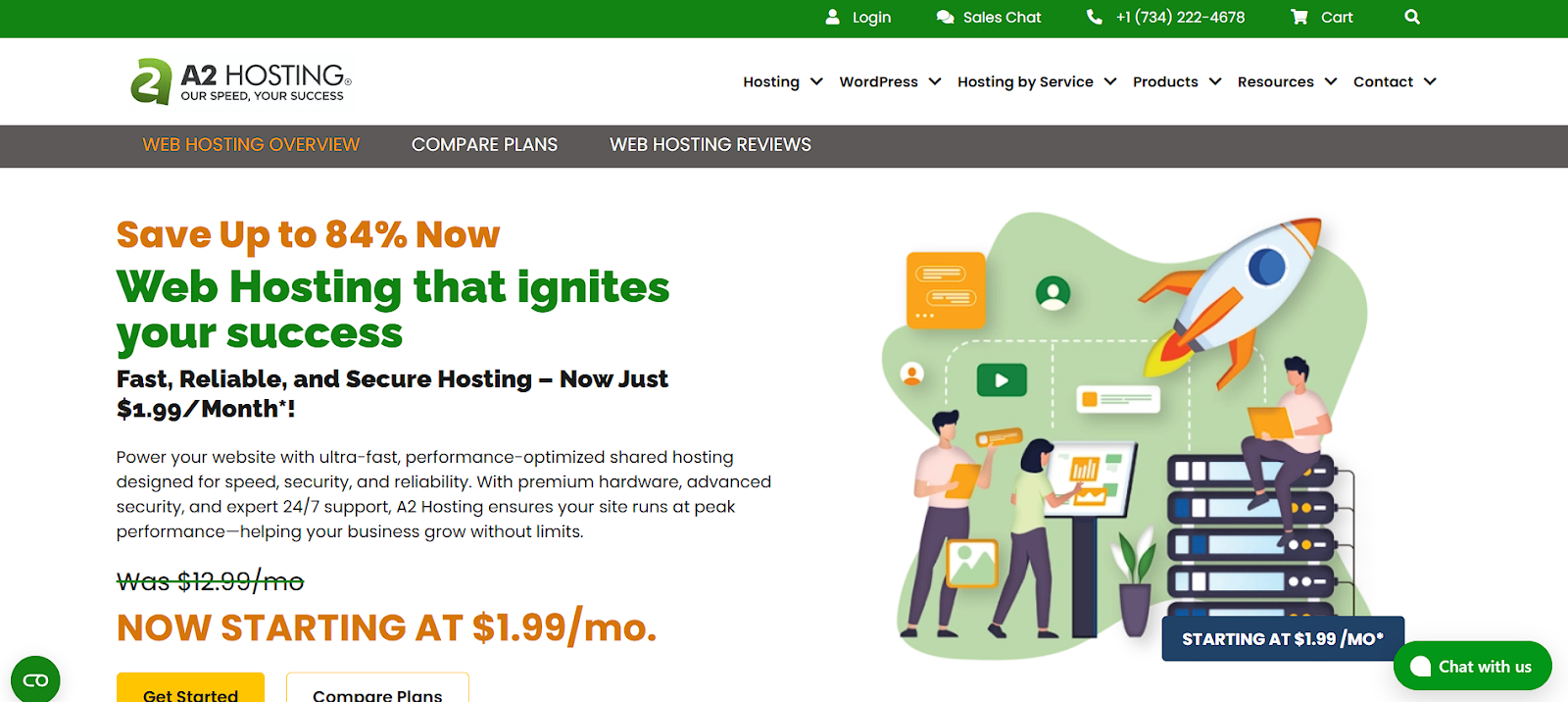
Key Features
A2 Hosting emphasizes speed and reliability:
- WordPress Optimization: Pre-installed or one-click WordPress installation
- Turbo Servers: Select plans offer significantly faster speeds
- Multiple Server Locations: Choose a data center closer to your audience
- Free SSL Certificate: Secure your site with HTTPS
- Anytime Money-Back Guarantee: Flexible refund policy
- Developer Tools: SSH access, WP-CLI support, PHP version selection
- 24/7 Support: Their “Guru Crew” available around the clock
Pricing
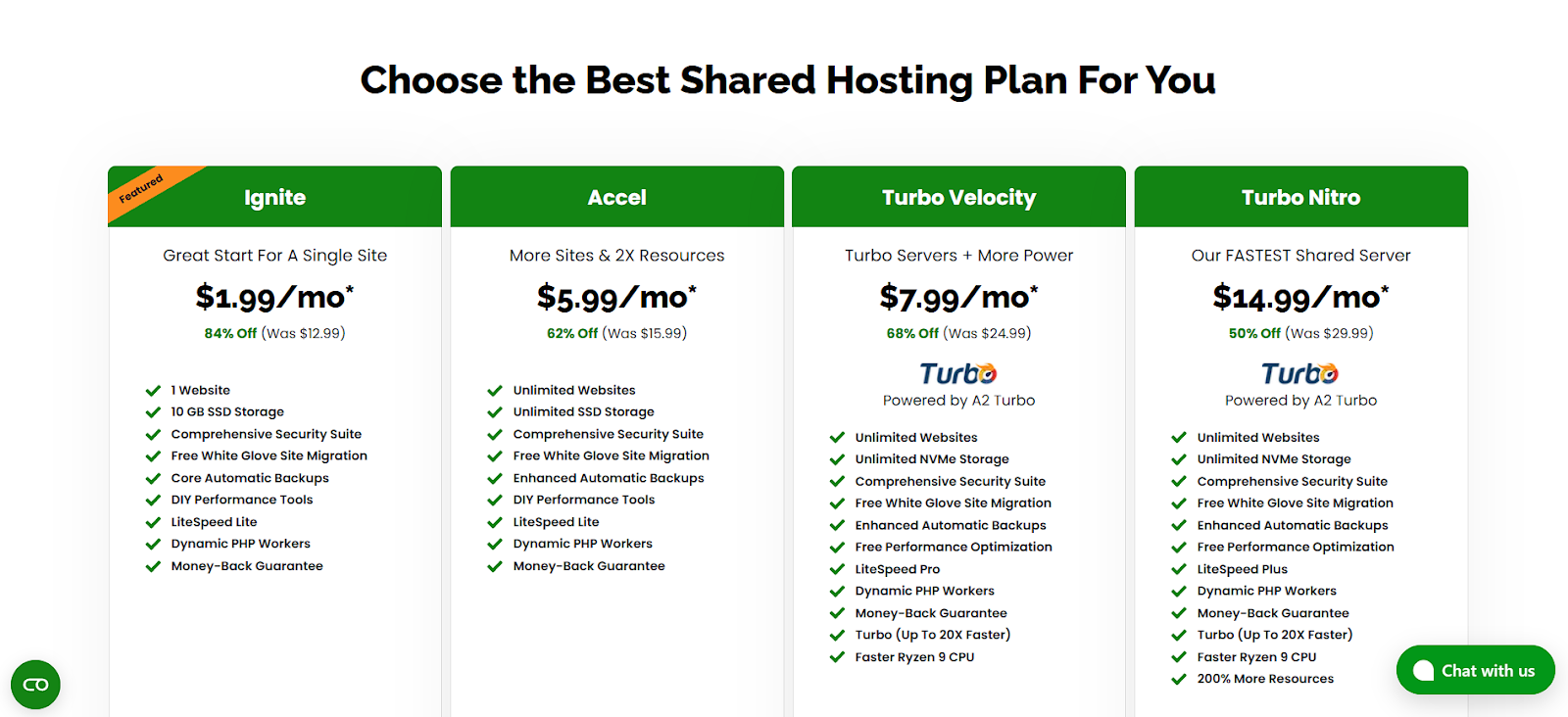
A2 Hosting offers shared hosting plans with promotional discounts:
- Ignite: $1.99/month (originally $12.99) – 1 website, 10 GB SSD storage
- Accel: $5.99/month (originally $15.99) – Unlimited websites and storage
- Turbo Velocity: $7.99/month (originally $24.99) – Unlimited websites, NVMe storage, Turbo servers
- Turbo Nitro: $14.99/month (originally $29.99) – Fastest shared option, 200% more resources
Ideal For
A2 Hosting works best for:
- Users who prioritize website speed
- Developers wanting access to technical tools
- Those wanting flexible money-back policies
- Sites needing specific server locations for performance
Selecting the Ideal Hosting Alternative for Your Specific Needs
Choosing the right hosting provider involves more than just comparing prices. It requires a careful evaluation of your website’s specific requirements and your own technical expertise. Let’s delve into some key factors to consider when making your decision.
Deep Dive into Understanding Your Website’s Requirements
Before you start comparing hosting plans, take a moment to analyze your current and future website needs more in-depth. Ask yourself these detailed questions:
- What is the primary purpose of your website? (e.g., selling products, sharing information, building a community). This will influence the features and resources you need.
- What kind of content will you be hosting? (e.g., mostly text, large images, videos, downloadable files). This will impact your storage and bandwidth requirements.
- How much traffic do you realistically anticipate in the short term and long term? Use tools like Google Analytics to understand your current traffic patterns and estimate future growth based on your marketing plans.
- What are your performance expectations for your website? (e.g., page load times under 3 seconds, ability to handle concurrent users without slowdowns). This will guide your choice of server type and resources.
- Do you require specific software versions (like PHP) or support for particular programming languages? This is important if you have custom applications or specific development needs.
- What is your absolute maximum budget for hosting, and are you comfortable with annual commitments for better pricing? Factor in potential costs for add-ons or upgrades.
- How comfortable are you with the technical aspects of website management? Do you need a fully managed service where the provider handles most things, or are you comfortable with more control and self-management?
- Do you need specific security features like PCI compliance for handling online payments? This is crucial for e-commerce websites.
- Will you need multiple email accounts associated with your domain? Check the number of email accounts offered by different plans.
- Do you plan to use a CDN to improve website speed for a global audience? Some hosting providers offer built-in CDN integration.
Thoroughly answering these questions will provide a solid foundation for evaluating different hosting options and selecting the one that best aligns with your unique needs.
In-Depth Evaluation of Key Hosting Features
Once you have a clear understanding of your website’s needs, you can start evaluating the features offered by different hosting providers in more detail. Here’s a more comprehensive look at crucial aspects to consider:
- Performance and Speed: Beyond SSD storage, consider the type of SSD (NVMe is faster), the server infrastructure (e.g., LiteSpeed servers), and the availability of advanced caching mechanisms like Memcached or Redis.
- Reliability and Uptime: Don’t just look at the percentage (e.g., 99.9% uptime). Understand what that translates to in terms of potential downtime per year. Read reviews and check the provider’s service level agreements (SLAs).
- Security: Investigate the specific security measures they have in place, such as the frequency of malware scans, the sophistication of their firewalls (e.g., web application firewalls), and their response protocols in case of a security incident.
- Scalability: Understand how easy it is to upgrade your resources if your website traffic grows. Is it a seamless process, or will it involve downtime and complex migrations? Consider both vertical scaling (adding more resources to an existing server) and horizontal scaling (distributing your website across multiple servers).
- Customer Support: Explore the different support channels available (e.g., live chat, phone, email, ticketing system), their hours of operation, and the average response times. Look for independent reviews of their support quality and expertise.
- Ease of Use: If you’re not a technical expert, a user-friendly control panel (like cPanel or a custom dashboard) is essential. Check if they offer one-click installers for popular applications like WordPress.
- Specific Features: Depending on your needs, consider features like staging environments for testing changes, developer tools (e.g., SSH access, Git integration), e-commerce features (e.g., free payment gateway integrations), and the availability of website builder tools.
By delving deeper into these features, you can make a more informed decision about which hosting provider offers the best value for your specific requirements.
Detailed Comparison of Hosting Plan Specifications
Going beyond the basic specifications, take a closer look at the fine print of different hosting plans:
- Storage Space: Understand the difference between disk space and inode limits (the number of files you can store). For large websites with many files, inode limits can be more critical than raw storage space.
- Bandwidth: Be aware of how bandwidth is measured and what happens if you exceed your limit (e.g., overage charges, website suspension). Estimate your bandwidth needs based on your expected traffic and the size of your web pages.
- Number of Websites Allowed: If you plan to host multiple websites, carefully check the plan’s restrictions. Some “unlimited” plans may have fair usage policies.
- Email Accounts: Consider the storage space allocated per email account and the features offered (e.g., webmail access, spam filtering).
- Database Support: Ensure the plan supports the type and version of databases you need (e.g., MySQL, PostgreSQL). Check the number of databases allowed.
- Server Location: If your target audience is geographically specific, choose a hosting provider with servers located closer to them to improve website loading times.
Remember to read the terms of service carefully to understand any limitations or restrictions associated with the hosting plans you are considering.
Smoothly Transitioning to a New Hosting Provider: A Step-by-Step Guide
Migrating your website to a new hosting provider requires meticulous planning and execution. Here’s a more detailed step-by-step guide to ensure a smooth transition.
Comprehensive Pre-Migration Planning and Preparation
Thorough preparation is the cornerstone of a successful website migration:
- Conduct a Full Website Audit: Before you move, take stock of everything on your website. Identify all files, databases, email accounts, and any custom configurations. This will ensure you don’t miss anything during the migration.
- Choose the Right Migration Method for Your Skill Level: If you’re not comfortable with the technical aspects, opting for professional migration services is highly recommended. While manual migration offers more control, it also carries a higher risk of errors for less experienced users.
- Create a Detailed Migration Checklist: Break down the entire migration process into smaller, manageable tasks. This will help you stay organized and track your progress.
- Communicate with Your New Hosting Provider: If you’re using their migration services, provide them with all the necessary information and access credentials well in advance. Clarify their migration process and timeline.
- Lower Your Website’s TTL (Time-to-Live) Value: Before you start the migration, reduce the TTL value for your domain’s DNS records. This will shorten the time it takes for DNS changes to propagate after the migration. You can usually do this through your domain registrar’s control panel.
- Prepare a Maintenance Page: Inform your website visitors that your site will be undergoing maintenance during the migration. This provides a better user experience than displaying errors or broken pages.
Executing the Website Migration with Precision
Follow these steps carefully when migrating your website:
- Set Up Your Account and Configure Basic Settings: Once your new hosting account is active, configure any necessary settings, such as setting up email accounts or creating databases.
- Transfer Your Website Files Using Your Chosen Method: Whether you’re using FTP, a migration plugin, or relying on your hosting provider’s services, ensure that all your website files are transferred completely and accurately. Verify the file transfer by comparing the file counts and sizes on both servers.
- Import Your Database Correctly: If you’re manually importing your database, double-check the import process in phpMyAdmin or your database management tool to avoid errors. Ensure that the database username, password, and hostname are correctly configured in your website’s configuration file (e.g., wp-config.php for WordPress).
- Test Your Website on a Temporary URL (If Available): Many hosting providers offer a temporary URL or a way to preview your website on their servers before updating the DNS. This allows you to thoroughly test your site in the new environment without affecting your live website.
- Update DNS Records at Your Domain Registrar: Once you’ve confirmed that your website is working correctly on the new server, update your domain’s nameservers to point to your new hosting provider. Ensure you enter the correct nameserver information provided by your new host.
Comprehensive Post-Migration Checks and Verification
Thorough testing is crucial to ensure a successful migration:
- Perform Detailed Functional Testing: Go through every page, click every link, submit every form, and test all interactive elements on your website. Check for broken images, incorrect formatting, and any other issues.
- Test Your Website on Different Browsers and Devices: Ensure that your website displays and functions correctly across various browsers (Chrome, Firefox, Safari, Edge) and on different devices (desktops, laptops, tablets, smartphones).
- Verify All Integrations: If your website integrates with any third-party services (e.g., payment gateways, email marketing platforms, analytics tools), test these integrations to ensure they are working correctly with the new hosting environment.
- Check Your Website’s Speed and Performance: Use website speed testing tools like Google PageSpeed Insights or GTmetrix to analyze your website’s loading times and identify any performance bottlenecks on the new server.
- Monitor Your Website for Errors: Monitor your website’s error logs and any monitoring tools provided by your hosting provider to identify and address any issues that may arise after the migration.
- Inform Your Visitors (Optional): Once you’re confident that your website is working correctly on the new host, you can remove the maintenance page and announce the successful migration to your visitors.
Only after you have thoroughly tested and verified your website on the new hosting should you consider canceling your old hosting account. Keep your old account active for a few days as a backup in case any unexpected issues arise.
Fine-Tuning Your Website on Its New Hosting Home: Advanced Optimization Strategies
Moving your website is just the beginning. To truly maximize performance and security on your new hosting, consider these more advanced optimization strategies.
Advanced Techniques for Enhancing Website Speed and Performance
Take your website’s speed to the next level with these techniques:
- Optimize Your Database: Regularly optimize your WordPress database to remove unnecessary data and improve efficiency. You can use plugins like WP-Optimize or perform database optimization through phpMyAdmin.
- Implement Lazy Loading: Enable lazy loading for images and videos so that they are only loaded when they are visible in the user’s viewport. This can significantly improve initial page load times, especially for content-heavy websites.
- Use HTTP/2 or HTTP/3: Ensure your hosting provider supports the latest HTTP protocols (HTTP/2 or HTTP/3), which offer significant performance improvements over older versions.
- Prefetch and Preconnect: Implement DNS prefetching and preconnect to establish connections to third-party resources (like CDNs or analytics providers) earlier in the page loading process.
- Optimize Your Theme and Plugins: Review your WordPress theme and plugins regularly for performance issues. Choose lightweight and well-coded options and remove any plugins that you are not actively using.
- Consider Using a Faster PHP Version: Ensure you are using the latest stable version of PHP supported by your hosting provider, as newer versions often include performance improvements.
Implementing Robust Security Best Practices
Go beyond the basics to fortify your website’s security:
- Implement Two-Factor Authentication (2FA): Enable 2FA for your hosting account, WordPress admin area, and email accounts to add an extra layer of security.
- Change Default WordPress Database Prefix: Change the default wp_ prefix for your WordPress database tables to make it harder for attackers to target your database.
- Disable Directory Browse: To prevent visitors from Browsing the directories on your web server, add an Options -Indexes directive to your .htaccess file.
- Secure Your .htaccess File: Properly configure your .htaccess file to implement various security measures, such as preventing hotlinking and protecting sensitive files.
- Regularly Review User Permissions: Ensure that all user accounts on your WordPress website have the appropriate level of permissions and remove any unnecessary or inactive user accounts.
- Implement a Web Application Firewall (WAF): A WAF can help protect your website from common web attacks by filtering malicious traffic. Many security plugins and some hosting providers offer WAF functionality.
Proactive Monitoring and Maintenance Strategies
Maintain the health and security of your website with these proactive measures:
- Set Up Website Monitoring Alerts: Configure monitoring tools to alert you immediately if your website experiences downtime or other issues.
- Regularly Check Security Logs: Review your server logs and security plugin logs for any suspicious activity or potential security breaches.
- Perform Regular Security Audits: Periodically conduct thorough security audits of your website to identify and address any vulnerabilities.
- Keep Software Up to Date: As emphasized before, consistently update your WordPress core, themes, and plugins to the latest versions to patch security vulnerabilities.
- Stay Informed About Security Threats: Keep up-to-date on the latest web security threats and best practices to ensure your website remains protected.
By implementing these advanced optimization and security strategies, you can ensure that your website performs optimally and remains secure in its new hosting environment.
Conclusion
The web hosting landscape in 2025 offers a diverse array of options beyond Liquid Web. Whether you prioritize seamless WordPress integration with Elementor Hosting, value exceptional support from SiteGround, or seek the flexibility of Cloudways, understanding your specific needs and carefully evaluating the features and benefits of each alternative is key.
By considering factors like performance, reliability, security, and scalability, and thoughtfully planning your migration and optimization strategies, you can find the perfect hosting partner to power your online presence. Remember that the right hosting choice is an investment in your website’s success.
FAQ
What is managed WordPress hosting, and is it right for me?
Managed WordPress hosting is a service specifically designed for WordPress websites. The hosting provider takes care of many technical aspects, such as automatic updates, backups, security, and performance optimization, allowing you to focus on creating content and managing your website. It’s a great option if you want a hassle-free experience and don’t have the technical expertise or time to manage these tasks yourself. However, it can be more expensive than shared hosting.
How do I accurately determine the hosting resources my website needs to avoid overpaying or experiencing performance issues?
To determine your hosting resource needs, start by analyzing your current website’s usage (if applicable) using your hosting control panel or analytics tools. Consider your average monthly traffic, the size of your website files, and your database size.
If you’re launching a new website, estimate your initial traffic and storage needs based on your content plan. It’s generally better to start with a plan that meets your current needs with some room for growth, as you can always upgrade later if necessary. Don’t hesitate to consult with your chosen hosting provider’s sales or support team for recommendations based on your specific requirements.
What are some common pitfalls to avoid during a website migration to a new hosting provider?
Some common pitfalls to avoid during a website migration include
- Not creating a full backup before starting the process
- Rushing the migration without proper planning
- Forgetting to transfer all website files and databases, and not updating the DNS records correctly
- Failing to test the website after the migration thoroughly
- Not keeping the old hosting account active for a short period as a backup
It’s also important to choose a migration method that aligns with your technical skills and to seek professional help if you’re unsure about any step.
Beyond the basics, what are some often overlooked security measures that website owners should implement on their hosting environment?
Beyond basic security measures like SSL certificates and strong passwords, some often overlooked security measures include implementing two-factor authentication for all website-related accounts, regularly changing passwords, limiting file upload sizes, disabling directory Browse, securing your .htaccess file, using a web application firewall (WAF), and regularly reviewing user permissions.
Additionally, staying informed about the latest security vulnerabilities and keeping all your website software (including WordPress core, themes, and plugins) up to date are crucial for maintaining a secure hosting environment.
Looking for fresh content?
By entering your email, you agree to receive Elementor emails, including marketing emails,
and agree to our Terms & Conditions and Privacy Policy.

